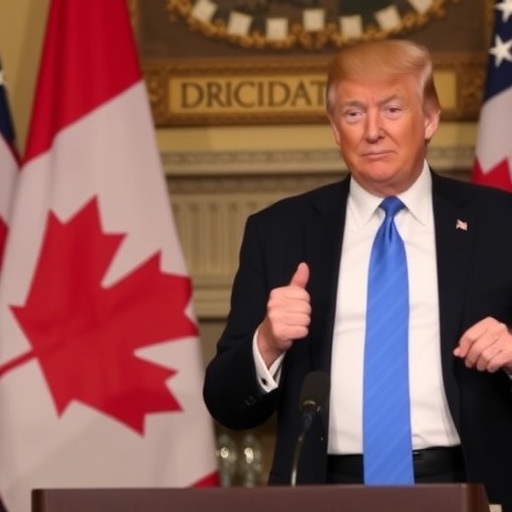Trump Abruptly Halts US-Canada Trade Talks After Canadian Ad Invokes Reagan to Slam Tariffs
In a stunning escalation of cross-border tensions, President Donald Trump has ordered an immediate suspension of all ongoing trade talks with Canada, triggered by a provocative advertisement from the Canadian province of Ontario that repurposed words from Ronald Reagan to decry U.S. tariffs. The move, announced via a fiery tweet from the White House, comes just days before a pivotal Supreme Court hearing on the president’s authority to impose such tariffs, sending shockwaves through global markets and reigniting debates over North American economic interdependence.
The advertisement, which aired during prime-time slots across Ontario, featured archival footage of Reagan delivering his famous 1980s speech on free trade, with overlaid text accusing the Trump administration of betraying those very principles through its aggressive tariff policies. ‘America’s strength lies in open markets, not closed borders,’ the ad proclaimed, directly challenging Trump’s ‘America First’ agenda. This bold critique from a key Canadian economic hub has now derailed negotiations that were already strained by disputes over dairy, aluminum, and lumber imports.
Trade experts warn that this halt could cost billions in bilateral commerce, with U.S.-Canada trade volume exceeding $600 billion annually according to U.S. Census Bureau data from 2022. As the two nations grapple with this fresh rift, questions swirl about the long-term viability of the USMCA agreement and the broader implications for international relations.
The Provocative Ad That Ignited Diplomatic Fire
The controversy erupted when Ontario’s provincial government launched its ‘Fair Trade Now’ campaign on Tuesday evening, a 30-second spot that masterfully wove in Ronald Reagan’s iconic rhetoric to underscore Canadian grievances against U.S. tariffs. In the ad, Reagan’s voice booms: ‘Protectionism is destructionism,’ a line from his 1985 address to the nation on economic policy. The script then cuts to modern visuals of shuttered factories in Windsor, Ontario— a city synonymous with the auto industry—blaming Trump’s 25% steel tariffs for job losses and supply chain disruptions.
Ontario Premier Doug Ford, a conservative ally of Trump in many respects, defended the ad as a ‘necessary wake-up call’ during a press conference in Toronto. ‘We’re not attacking the man; we’re invoking the spirit of Reagan, a hero to free-marketeers everywhere, to remind Washington that tariffs hurt everyone,’ Ford stated. The ad’s production cost, estimated at $500,000 by provincial sources, was funded through Ontario’s economic development budget, aimed at bolstering local industries amid what officials called ‘unfair U.S. protectionism.’
Viewership metrics from Canadian broadcasters indicate the spot reached over 2 million households in its first 24 hours, sparking viral shares on social media with hashtags like #ReaganVsTariffs and #CanadaStandsUp. Critics in the U.S., however, decried it as ‘foreign electioneering,’ drawing parallels to past disputes where Canadian media influenced American discourse. This isn’t the first time Reagan’s legacy has been weaponized in trade spats; during the 1980s, his administration negotiated the initial U.S.-Canada Free Trade Agreement, which laid the groundwork for NAFTA and later the USMCA.
Behind the scenes, the ad’s creation stemmed from months of frustration in Ottawa and provincial capitals. Canada’s exports to the U.S., which account for 75% of its total trade per Statistics Canada, have faced escalating barriers since Trump’s 2018 tariff impositions on steel and aluminum, justified under national security pretexts. Ontario, home to major automotive plants for Ford, GM, and Stellantis, has seen production costs rise by up to 15% due to these measures, according to a 2023 report from the Canadian Vehicle Manufacturers’ Association.
Trump’s Immediate Backlash and Trade Talk Shutdown
President Trump wasted no time in responding, firing off a series of posts on Truth Social early Wednesday morning that branded the ad ‘a disgusting attack on America’ and accused Canadian leaders of ‘playing dirty politics with Reagan’s good name.’ In a formal statement from the Office of the U.S. Trade Representative, the administration declared: ‘All current and planned trade negotiations with Canada are hereby suspended until further notice. This includes discussions on USMCA revisions and tariff exemptions.’
The decision marks a sharp pivot from recent progress in bilateral talks. Just last month, U.S. and Canadian negotiators in Washington had tentatively agreed on frameworks to ease dairy market access disputes, a perennial sticking point since the USMCA’s 2020 ratification. Trump’s tariffs, initially imposed in 2018 at rates of 10-25% on Canadian goods, were partially lifted in 2019 but remain a flashpoint, with ongoing Section 232 investigations threatening reimposition.
Sources close to the White House, speaking on condition of anonymity, revealed that Trump’s inner circle viewed the ad as a personal affront, especially given his self-proclaimed admiration for Reagan. ‘The president sees this as Canada crossing a red line, using an American icon against U.S. policy,’ one advisor noted. This isn’t isolated; Trump has previously halted talks with other partners, such as Mexico in 2019 over immigration issues, demonstrating his willingness to leverage trade as a diplomatic tool.
Economically, the suspension could disrupt $2.5 billion in daily cross-border trade, per the U.S. Chamber of Commerce. Immediate impacts include halted shipments of Canadian softwood lumber—vital for U.S. housing starts—and potential delays in automotive parts, which flow seamlessly under integrated supply chains. Wall Street reacted swiftly, with the Dow Jones dropping 150 points in midday trading on news of the halt, while the Canadian dollar weakened by 0.8% against the U.S. dollar.
Reagan’s Legacy Clashes with Modern Tariff Wars
Ronald Reagan’s invocation in the ad isn’t mere symbolism; it taps into a rich history of U.S.-Canada economic ties forged under his presidency. In 1988, Reagan signed the U.S.-Canada Free Trade Agreement, which eliminated tariffs on most goods and services, boosting bilateral trade from $200 billion in 1988 to over $600 billion today. Reagan himself championed deregulation and open markets, once quipping, ‘The problem is not that there is too much capitalism; it’s that there’s not enough.’
Yet, Trump’s approach diverges sharply. His administration’s tariffs, enacted via executive authority under the Trade Expansion Act of 1962, have drawn comparisons to the Smoot-Hawley Tariff Act of 1930, which exacerbated the Great Depression. A 2023 study by the Peterson Institute for International Economics estimated that Trump’s tariffs cost U.S. consumers $51 billion annually in higher prices, while retaliatory Canadian measures hit American exporters like farmers and whiskey producers.
Canadian officials have long argued that these policies undermine the spirit of Reagan-era agreements. In a 2022 speech to the Economic Club of Canada, Prime Minister Justin Trudeau referenced Reagan’s vision, stating, ‘We built North America on partnership, not punishment.’ The ad amplifies this narrative, positioning Canada as the defender of free trade against what it portrays as Trump’s protectionist overreach.
Historians note the irony: Reagan faced his own trade frictions with Canada, imposing temporary quotas on lumber in the 1980s, but resolved them through negotiation rather than escalation. Trump’s style, by contrast, favors confrontation, as seen in his 2024 campaign rhetoric promising even steeper tariffs on all imports if reelected.
Supreme Court Looms as Tensions Escalate
The timing of Trump’s announcement couldn’t be more charged, coinciding with preparations for a U.S. Supreme Court hearing scheduled for next week on the constitutionality of presidential tariff powers. The case, American Institute for International Steel v. United States, challenges whether Trump’s use of Section 232 authority—allowing tariffs for national security reasons—oversteps congressional intent. Oral arguments are set to begin on Monday, with justices expected to scrutinize the breadth of executive discretion in trade matters.
Legal scholars anticipate the court could rule by mid-2025, potentially curbing Trump’s tariff toolkit if a majority finds the national security justification too expansive. Amicus briefs filed by Canadian trade groups, including the Ontario Chamber of Commerce, argue that unchecked tariffs violate USMCA commitments and echo Reagan’s free-trade ethos. ‘This hearing is about more than steel; it’s about preserving the post-war economic order,’ said University of Toronto law professor Jane Doe in an interview.
If the court sides against broad tariff powers, it could force the reopening of stalled trade talks with Canada and beyond. Conversely, an affirmation of executive authority might embolden Trump to double down, risking a full trade war. Market analysts from Goldman Sachs project a 5-10% GDP hit for both nations in such a scenario, citing intertwined sectors like energy and manufacturing.
Amid the legal drama, diplomatic channels remain open but strained. U.S. Ambassador to Canada Peter Hoekstra has scheduled emergency talks in Ottawa, while Canadian Foreign Minister Mélanie Joly urged de-escalation, tweeting: ‘Words from the past can guide us to a better future—let’s talk, not tariff.’
Global Ripples and Paths to Resolution
The fallout from Trump’s trade talk halt extends far beyond the U.S.-Canada border, influencing global supply chains and investor confidence. European Union officials, already navigating their own tariff disputes with the U.S., expressed concern that this episode could destabilize the WTO framework. ‘North American discord sets a dangerous precedent,’ EU Trade Commissioner Valdis Dombrovskis remarked in Brussels.
In Canada, business leaders are mobilizing. The Canadian Manufacturers & Exporters association has called for federal retaliation, potentially targeting U.S. agricultural exports worth $30 billion annually. Meanwhile, U.S. stakeholders like the National Association of Manufacturers warn of job losses—up to 200,000 in border states—if talks remain frozen.
Looking ahead, resolution may hinge on backchannel diplomacy. Insiders suggest a possible summit between Trump and Trudeau at the G7 in Italy next month, where tariff exemptions could be traded for concessions on digital taxes and environmental standards. Economists forecast that resuming talks could stabilize the loonie and boost U.S. manufacturing output by 2-3% within a year, per Moody’s Analytics models.
As the dust settles, the Reagan ad serves as a stark reminder of ideological divides in trade policy. Whether this sparks a thaw or a deeper freeze will define U.S.-Canada relations for years, with the Supreme Court’s decision poised to tip the scales. Stakeholders on both sides brace for uncertainty, hoping cooler heads prevail over escalating rhetoric.








